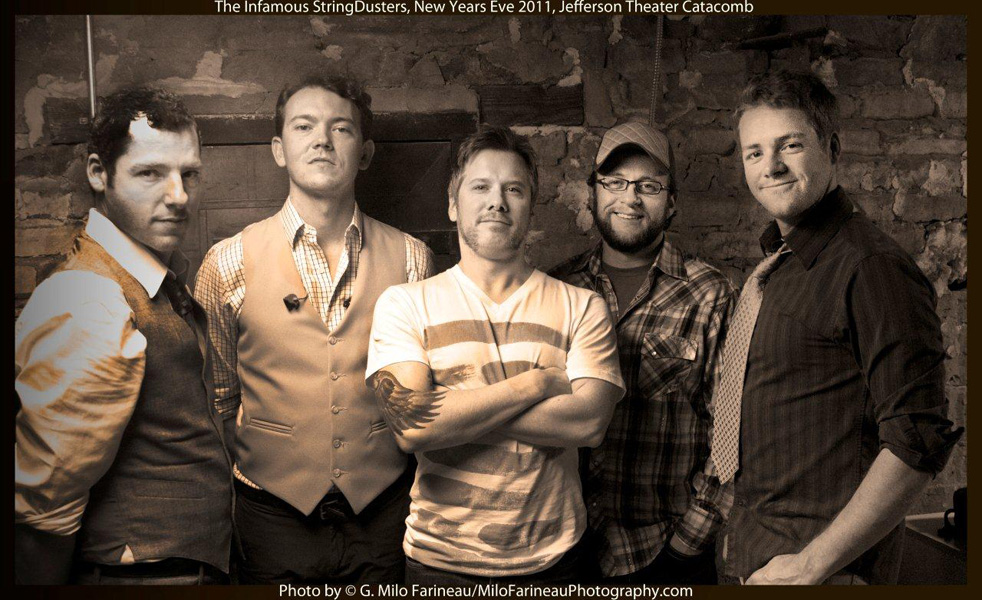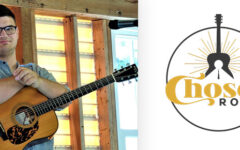
 Milo Farineau had the opportunity to catch up with Chris Pandolfi and Andy Falco of the Infamous Stringdusters the week after their sold out New Year’s Eve Performance at The Jefferson Theatre in Charlottesville, VA.
Milo Farineau had the opportunity to catch up with Chris Pandolfi and Andy Falco of the Infamous Stringdusters the week after their sold out New Year’s Eve Performance at The Jefferson Theatre in Charlottesville, VA.
Chris lives in an apartment off of the Downtown Mall which is one part gypsy minstrel workshop and one part electronic mad scientist’s lab. There are dismantled banjos and other instruments strewn on couches and chairs and multiple computer screens flashing hard drives transferring terabytes of streaming video to multiple computers.
Andy walks in and Chris starts explaining why one of the banjos is so cool “Look inside here! See this? It’s all wood inside! And this is FIVE ply…not three or four ply!” Chris hands Andy a banjo and tells him to check it out. Andy starts playing the banjo and Milo makes himself comfortable to do their interview.
MF: Chris, on your recent blog post you said “we have more incentive than ever before to create, record and perform our music.” What’s the source of that incentive?
CP: What I meant by that is that now, post (our relationship with) Sugar Hill Records, where we are getting to tailor every aspect of what we do, from how much we want to work, what we want to do, in light of that we have decided that we want to record and release more music so for our shows, having a lot of new material to play live is a great thing. Fans love it. With as much as we are playing and as much as we want to release music we have such good incentive now to create and rehearse and to learn as a band, and I think that is just one of the really exciting things that’s going on.
MF: You also said “Soon we’ll be raising money through Pledge Music to take the show/touring atmosphere over the top.” Can you elaborate on that?
CP: Pledge Music is basically a very cool service where bands get to create a marketplace with their fans. There are so many things that we can do, want to do as a band, but there is no infrastructure for us to communicate with our fans outside of what we are doing by ourselves. Pledge Music allows you to work with your fans, to provide things for them, everything from pre-ordered albums to signed set lists, to allowing the fans to make their own set list for a show. A band like ours has been around for six years, and we have a very grassroots following. The fans care, they want to help us out so we have to find ways to draw that out of them and pledge is a really good way of doing that. We want to kick that money back into creating a show and an experience at our concerts and festivals, everything we do with our High Country Recordings label, that is just as awesome as possible for our fans.
MF: You have a new studio album coming in the spring, and a great new relationship with producer/engineer Billy Hume. What led you to work with him?
AF: We met Billy through our manager, Michael Allenby, he had worked with him previously and introduced us. We met with in Atlanta before a show the first time and talked about music, and everyone’s approach to music and his vision seemed to line up with ours. We started doing some tracks with Billy and it has been an amazing experience. He has brought a whole other element to our music that was never there before in the sounds of things.
MF: It seems to be a trend, in the industry, for bands to be heading in this direction of managing their own labels, productions, promotions, etc., having more control. Is that your sense of it? Is it a natural progression for any musician or is it a reaction to something that’s been happening in the industry?
CP: I don’t think it is a natural progression. I wouldn’t say that every artist is cut out to take this path. For us it makes sense. We have a group of guys who enjoy working on our business and making things better, but the irony of it is that the goal of working on the business more is so that it frees the guys up more to work on the music and that is one of the big goals, too, and something I think we are achieving.
Since moving here to Charlottesville we’ve had the opportunity to work on more music than ever. There is still a lot of working on the business…..there’s a lot of working on everything right now. As far as taking things into your own hands, though, a lot of people might misconstrue that as a dig on SugarHill, but it’s not at all. SugarHill was a good early partner for us and then ultimately when we had a few years to grow into what we are now it only made sense for us to figure out more specifically what we want to do and maybe that mashes up really well with Sugar Hill, or in our case it didn’t necessarily. So that’s why a record deal comes to an end eventually. For us it really makes sense. We have a lot of good ideas. We have a lot of good thinkers in the band and I think it suits us well.
MF: What can we expect on your new studio album?
CP: It’s really cool. It’s the next step in a progression of collaborating as far as the writing goes. We’ve always worked on the arranging, but it was a first collaboration between the band and Billy, our new producer. It is full of new creative paths and now we have a new vision of recording that involves recording more often for cheaper, not doing an album once every two years for a lot of money. We are in the early phases of a new process that will involve more recording, more regular recording, so that’s, to me, this album is chock full of great material, some cool collaborations, there are horns on there, Rubblebucket has some stuff on there. For us it’s the first step in a longer journey
MF: So, now you’re officially a five piece band. What made you decide to go forward sans mandolin?
CP: I talked about this a little bit on my blog. We didn’t premeditate this. We went out and did a couple shows as a five piece, because we only had five guys at the time. We went out and we just loved it. We didn’t feel like there was anything lacking. Once you get past this idea that there is something missing and you just pay attention to what is there now people started to play a little differently and it isn’t that we don’t love playing with a great mandolin player, it just felt like we could do something great, with just the five of us, it felt right and so we went with it. I think in retrospect everyone is really excited about it. It doesn’t mean less energy or less volume, it just means more space, more options, and more things that can happen.
AF: Everyone’s role just slightly changed a little bit to accommodate, sonically, musically. Everyone just changed what they were doing and there was no void. In a lot of ways, I feel like just having one less soloist, has actually made the music a little bit more accessible to more people and they’re reacting to it better.















